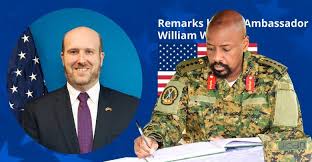In a developing diplomatic showdown, the United States of America envoy to Uganda, William Popp, is scheduled to meet with President Yoweri Museveni at State House in Entebbe this Thursday.
The meeting comes in the wake of a bold ultimatum issued by General Muhoozi Kainerugaba, Chief of Defence Forces demanding a personal apology from Ambassador Popp to President Museveni.
Muhoozi’s ultimatum, issued last Friday, warned that failure by Ambassador Popp to apologize for what he termed “undiplomatic conduct” would result in the Ugandan government seeking the ambassador’s expulsion.
The apology was expected by 9:00 am Monday, but the U.S Embassy has since denied receiving any formal request for an apology. “Neither the US Embassy nor Amb Popp have received any formal request to apologize from the Ugandan government on any matter, nor has he apologized,” the embassy clarified in a statement.
Despite the embassy’s refutation, tensions remain high.
Thursday’s meeting, according to Nile Post, is expected to address the brewing discord between Uganda and the United States. In attendance will be key Ugandan officials, including General Muhoozi and General Jeje Odongo, the Minister of Foreign Affairs, indicating the gravity of the situation.
The diplomatic spat began when General Muhoozi accused Ambassador Popp of disrespecting President Museveni and Ugandans, though details of the “undiplomatic conduct” remain unclear.
Speculation suggests the friction could be related to the U.S Embassy’s alleged stance against President Museveni’s potential bid for a seventh term in 2026.
Sources intimate that the U.S may have urged President Museveni to step aside, which could have triggered Muhoozi’s strong response.
Without revealing much, General Muhoozi had initially taken to X (formerly Twitter) to issue the ultimatum, although the posts were later deleted. However, the ultimatum has not dissipated, and the stakes have only grown with the upcoming meeting.
Muhoozi’s demands come at a time when Uganda-U.S relations have faced turbulence, particularly over issues related to human rights, governance, and democracy under Museveni’s administration.
Last Wednesday, the U.S government sanctioned four Ugandan police officers and their immediate families for gross human rights violations, further straining the already fragile relations.
This is not the first time General Muhoozi has stoked diplomatic tensions with foreign governments.
Last year, he caused uproar in neighboring Kenya when he claimed Uganda’s army could capture Kenya within two weeks, leading to backlash and a public rebuke from President Museveni, who ordered his son to stay off social media.
General Muhoozi has reiterated his admiration for the U.S but emphasized that foreign interference in Uganda’s governance will not be tolerated.
“This is not a personal issue between me and the current US Ambassador. This is a national issue, and you’ll see that no foreign country will ever dominate Uganda again,” Muhoozi stated in his ultimatum. His words reflect growing nationalist sentiment within Uganda’s leadership, particularly concerning perceived foreign interference in domestic affairs.
For President Museveni, the meeting with Ambassador Popp could offer a chance to smooth over tensions while reaffirming Uganda’s right to self-determination.





